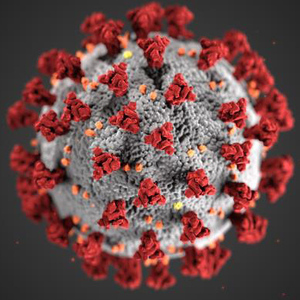Governors urge USDA to help biofuel producers survive COVID-19

Image: Centers for Disease Control and Prevention
April 20, 2020
BY Erin Krueger
The governors of Iowa, Minnesota, Nebraska and South Dakota sent a letter to Agriculture Secretary Sonny Perdue April 17 urging the agency to allocate funding to the biofuel sector to help address the “economic harm and job losses that biofuel producers are suffering” due to COVID-19.
“As governors, we are concerned about our nation’s agriculture and biofuel sector during the unprecedented economic circumstances brought on by the national pandemic of COVID-19,” the governors wrote, noting that motor fuel use has rapidly decreased due to COVID-19. “As most U.S. gasoline contains at least 10 percent ethanol, demand for our homegrown renewable fuels has significantly declined.”
The governors express concern for their farmers and producers who will bear the impact of that decrease in consumption. “This further damage an already hurting rural economy and has resulted in the closure of production facilities that employ many people in rural communities in our home states,” they continued. “As the U.S. Department of Agriculture (USDA) considers the allocation of additional funds provided to the Commodity Credit Corporation (CCC) by the Coronavirus Aid, Relief, and Economic Stabilization (CARES) Act we ask that you use this authority provided to assist the biofuel industry. The decrease in fuel consumption has left production facilities little choice but to idle production or close completely.”
Advertisement
The governors note that industry sources currently show that more than 4 billion gallons of ethanol demand has been destroyed since March 1. “The CCC was created to stabilize, support, and protect farm income and prices while also maintaining balanced and adequate supplies of agricultural commodities,” the governors wrote. “Farm income and market prices for corn and other crop commodities are directly linked to the health of the renewable fuel industry. Ethanol plants use 40 percent of all corn grown in the United States. In addition, biodiesel and renewable diesel producers currently use over 8 billion pounds of soybean oil per year, creating demand that adds 13 percent to the cash price of a bushel of soybeans. We have seen a significant drop in the price of corn and soybeans because of the decline in demand, and this puts our nation’s agriculture industry at great risk.”
The letter also addresses waiver requests the U.S. EPA recently received from several oil state governors, asking the agency to waive 2020 Renewable Fuel Standard blending requirements. “Doing so would only worsen the economic harm and job losses that biofuel producers are suffering, and would do nothing to improve the financial health of refiners,” the governors wrote. “The EPA and courts have repeatedly established that RIN costs do not adversely impact refineries because compliance costs are simply passed through in pricing for gasoline and diesel fuels. The COVID-19 crisis is inflicting severe economic harm on all participants in U.S. fuel supply chain. Using this global pandemic as an excuse to undercut the RFS is not just illegal; it would also sever the economic lifeline that renewable fuels provide for farmers, workers and rural communities across the Midwest.”
Advertisement
“Keeping biofuels plants open is vital for our states and we ask that you use your authority to assist the biofuel industry during this difficult time,” they continued. “We are supportive of the proposals the biofuel industry has put forward to reimburse feedstocks, and also believe that adding additional CCC funds to the Higher-Blends Infrastructure Incentive Program will drive future biofuel demand. Thank you for considering our request and for your dedication to rural America. We look forward to working with you to further protect American agriculture in response to COVID19.”
Growth Energy released a statement April 18 offering thanks to the four governors for writing the letter.
“Biofuel plants are the beating heart of the rural economy, and strong support from USDA is vital to keeping U.S. agriculture intact through the worst of this crisis,” said Emily Skor, CEO of Growth Energy. “Ethanol production provides jobs for our communities, a market for our farmers, sanitizer for our hospitals, animal feed for livestock operations, clean fuel for our vehicles, and vital carbon dioxide (CO2) for meatpackers, and municipal water treatment. We’re grateful to rural champions like Governors Reynolds, Walz, Ricketts, and Noem who are standing shoulder-to-shoulder with America’s biofuel industry to keep our vital supply chain moving. As more plants are forced to close, the damage will only continue to spread. We urge lawmakers and the USDA to take immediate, additional steps that are still needed to keep our plants open and protect the economic engine that will fuel America’s recovery.”
A full copy of the letter can be downloaded from the Growth Energy website.
Related Stories
The USDA has announced it will delay opening the first quarterly grant application window for FY 2026 REAP funding. The agency cited both an application backlog and the need to disincentivize solar projects as reasons for the delay.
Neste and DHL Express have strengthened their collaboration with the supply of 7,400 tons (9.5 million liters) of neat, i.e. unblended, Neste MY Sustainable Aviation Fuel to DHL Express at Singapore Changi Airport starting July 2025.
CoBank’s latest quarterly research report, released July 10, highlights current uncertainty around the implementation of three biofuel policies, RFS RVOs, small refinery exemptions (SREs) and the 45Z clean fuels production tax credit.
The U.S. Energy Information Administration maintained its forecast for 2025 and 2026 biodiesel, renewable diesel and sustainable aviation fuel (SAF) production in its latest Short-Term Energy Outlook, released July 8.
XCF Global Inc. on July 10 shared its strategic plan to invest close to $1 billion in developing a network of SAF production facilities, expanding its U.S. footprint, and advancing its international growth strategy.
Upcoming Events










